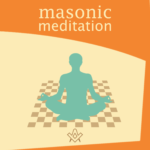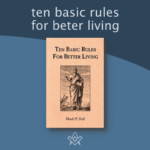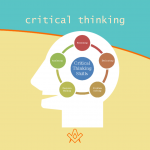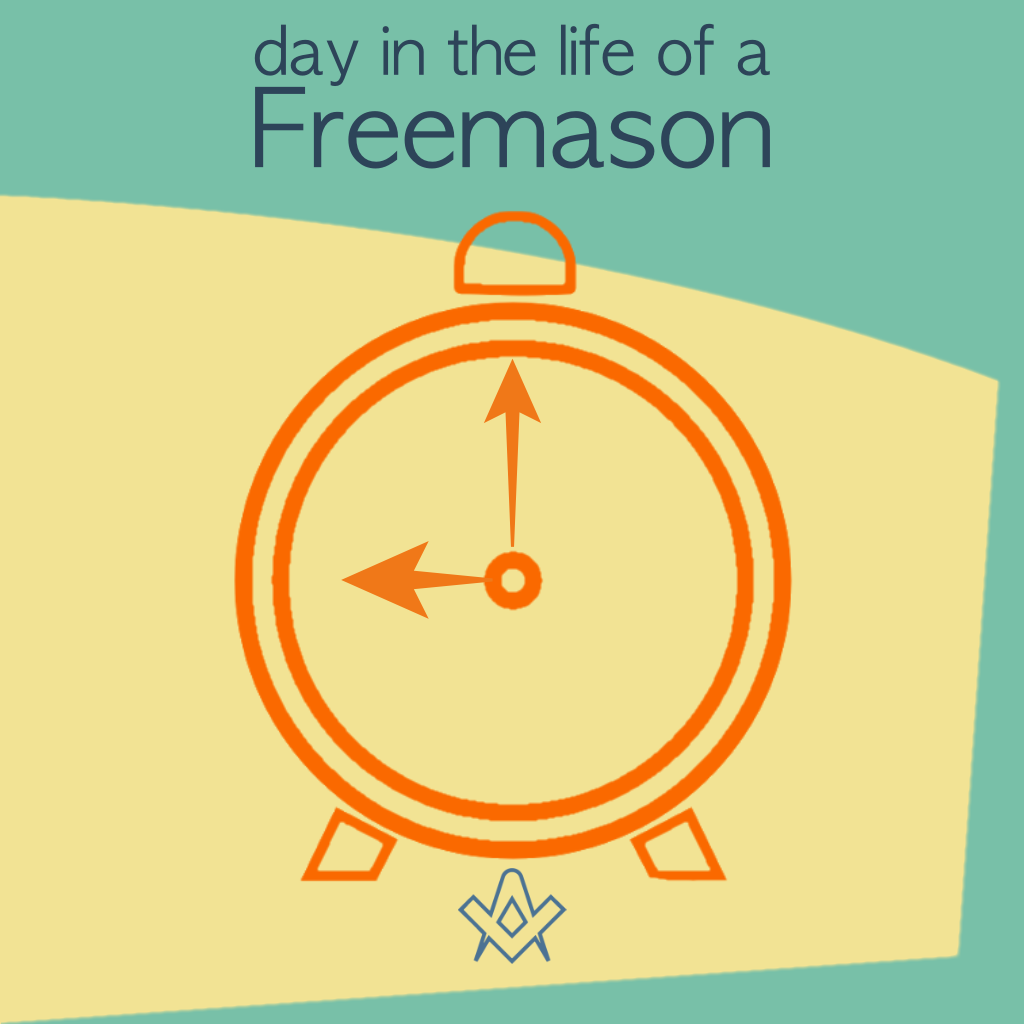Each morning we wake up to a new day, we are given the same 24 hours available to everyone on the planet.
The only thing that really separates us is how we make use of those 24 hours.
Some people will take the hours for granted, and they may get wasted.
Others will be only too thankful they have another day to add to their life.
The Freemason, on the other hand, can use the lessons taught in Freemasonry to make the best use of each hour for themselves.
The Entered Apprentice
The 24 inch Guage reminds us of the 24 hours in the day
These are the same 24 hours everyone has, no more no less, the challenge is to make the most of each hour.
So before you start the day, take a little time to plan your day ahead – plan your work, work your plan.
Plan that part of the day for labour and refreshment.
It is not about working hard, or being busy, as if busy is some badge of honour to wear with pride.
It is about working smart.
As humans, we have always made tools to make work easier and more efficient, especially repetitive tasks.
Unplanned days leads to more stress, more tension, and reactive decisions.
Try to keep calm, and make calculated decisions.
Experience will be your guide, to help teach you how to avoid potential difficulties ahead of time.
Always try to find time to help another in need, not being detrimental to yourself or connections.
Making time for a someone who needs it. Everyone needs to have a mentor or two.
Helping people, or mentoring when they ask for help:
![]()
when you talk
you share your knowledge
when you listen
you learn something new
The best in mentoring, is when it follows both ways.
When you stop and chat over a coffee, you listen, not always to answer.
Remember, just to be there, is sometimes all that is needed.
Remember those three very powerful words that will change your life – [that sounds interesting],
![]()
tell me more
Send a SMS [txt]. Sometimes that is enough, that someone else knows you care.
Don’t just speak to someone in your free time, free some time to speak to someone – know the difference.
At the closing hours of the day, try to save some time, a quiet moment, in silence, stillness, solitude.
Part in prayer to almighty God, or meditation with your own conscience.
We all need quiet time to process the day.
Time for your brain to work and your mind to help you find solutions to problems.
If for too many days, you have not been able to achieve your daily goals, if during your contemplation, you are not happy, then make a change, and try again.
![]()
don’t expect different results
by repeating
the same process,
day in day out
The Common Gavel symbolises moderation
Moderate your excesses – knock off all the superfluities and excesses.
Keep down those vain and unbecoming thoughts.
Moderate your emotions and opinions.
Avoid negative emotions, anger, or confrontation.
Never make a decision in anger, or say something you will regret.
Moderation in your words and actions.
People who express or possess extreme opinions:
![]()
often lack
the mental maturity
to entertain
alternative concepts
They close their minds.
They will often be excluded from strategic decision making processes.
Not to be confused with passion or enthusiasm. Know the difference. Or learn the difference.
The Chisel points out the advantages of education
Knowledge is what makes us fit members of well organised societies.
Aim to learn something new each day.
Learn something that helps you in your daily life, professional or personal.
Learn from every failure.
Learn from others.
![]()
What you see
praiseworthy in others
you will carefully imitate,
and what in them
may appear defective,
you will in yourself amend.
You can never stop learning – learn little and often.
Learn memory techniques so you can recall information.
If you learn just one new small thing each day, after a year, that is 365 new small things; in a lifetime (70 years) that would be 25,550 new small things.
You may think you cannot hold that amount of information; your brain can and when you need to recall them, your brain will bring them to you in your conscious memory.
The Fellowcraft
We symbolically use the working tools of the fellowcraft degree, to guide our interaction with other people, in both our personal and professional lives.
Meet on the Level
Start each encounter on a level footing.
Enter every encounter or negotiation, having first considered what the other side will see as a fair outcome for them.
Treat others as equals.
Judge with mercy and candour.
![]()
ought no eminence
of situation cause us to forget,
we are all human,
and that he who is on
the lowest spoke
of fortune’s wheel
is equally entitled
to our regard …
Deal with integrity – upright intentions
Hold a due medium between avarice, an ‘extreme greed for wealth or material gain’ and profusion, ‘extravagance, squandering, and waste’.
Do unto others as you would be done by.
Avoid confrontation – learn how.
Always consider the long term, not short term gains.
![]()
in all your pursuits
have eternity in view
Part on the Square
Conclude the encounter on good terms. Don’t burn bridges.
If an agreement is not concluded now, that is better for both sides than a bad deal for one side.
Don’t look on the encounter as being failed, just one not right at this time.
Learn from it, assess how it could be restructured to be fair for both sides.
Leave the door open to try again.
![]()
happy have we met,
happy have we been,
happy may we part
and happy to meet again
The Master Mason
The symbolic use of the working tools in the third degree remind us of our relationship with God, or our conscience.
At the end of the day is the time for reflection, to assess your day.
Have you acted with all good conscience, within that straight undeviating line of conduct laid down for our pursuit?
In the knowledge that your words and actions of the day are observed and recorded. Can you be proud, if others would read these back to you.
Have you kept within the bounds of good, not straying into evil.
If this was your last day, the closing hour of your existence, are you content with this day?
Were you able to perform your allotted tasks while it was yet day?
Did your words or action provide help or assistance to another?
Or did you feel under stress – did you get angry or short tempered?
Did you enter into every encounter on the level, acted with integrity, and parted in harmony?
Did you always do unto others as you would have them do unto you?
Did your words or action hurt another?
In today’s modern world, it is all too easy for a little road rage, flame mail, bad text message, unnecessary social media reply.
![]()
Did today
take you closer
to achieving
your dreams?

Tomorrow is a new 24 hours – the clock starts at 00:00 again.
A new opportunity to correct bad habits.
An opportunity to work on those things you did not do so well at today.
Maybe try some additional learning, experiment with some new techniques.
Maybe look for some additional tools [goods, services, assistance, advice] to help you work smarter.
It does not matter if you fail again, again, and again.
Never forgetting that,
![]()
each time we fail,
it is just another
valuable lesson
Learn from it, try something different each time.
Inspirational daily quotes
To receive 1 inspirational quote a day – follow our Facebook page and Instagram account – maybe share it to your own Facebook friends.
Article by: Nicholas J Broadway

Nicholas was initiated into Freemasonry in 1989 in Stonewell Lodge No. 9137, Essex England (UGLE) and was Master in 1995, 2011 and 2016. He also joined other UGLE craft Lodges and is a PZ in the Royal Arch Chapter.
He acquired the title of The Square Magazine in January 2020 and oversees the technical running of the digital publication.
Recent Articles: skills
 7 Soft Skills Taught In Freemasonry Discover how Freemasonry nurtures seven irreplaceable soft skills—collaboration; Communication, Teamwork, Empathy, Flexibility, Conflict Resolution, Active Listening, and Trustworthiness. Explore how these essential human attributes, grounded in emotional intelligence and ethical judgment, remain beyond the reach of AI. |
 Freemasonry and Reskilling in the age of AI The article explores the challenges and strategies organizations face in reskilling their workforce in the era of automation and artificial intelligence. It highlights the need for companies to view reskilling as a strategic imperative and involve leaders and managers in the process. The article also emphasizes the importance of change management, designing programs from the employee's perspective, and partnering with external entities. |
 Ten Central Commandments or Principles of Freemasonry Embrace the wisdom of Freemasonry's teachings in your personal journey towards self-improvement and stronger leadership. By upholding virtues of integrity, compassion, and respect, and uniting these with a commitment to continuous learning and social responsibility, inspire change. Transform yourself and the world around you, fostering a legacy of positivity and enlightenment. |
 Freemasonry: A Guide to Fatherhood In the sacred halls of Freemasonry, fathers discover a hidden power to transform their parenting journey. With its timeless values, supportive community, and life-enriching teachings, Freemasonry empowers fathers to provide a moral compass, foster self-improvement, build stronger connections, and embrace the confidence and wisdom needed to navigate the complex realm of fatherhood. |
 Courage as a core value in Freemasonry Freemasonry, a revered fraternity, prioritizes virtues like honesty and charity. However, courage is foundational. From Plato to Maya Angelou, courage is vital for other virtues. Freemasonry's teachings, referencing events like Gettysburg, emphasize diverse courage forms. In today's divided world, Masons promote and exemplify courage, understanding its importance in facing challenges. |
 How Freemasonry Cultivates Ideal Entrepreneurial Traits Freemasonry's cryptic rituals hold timeless lessons for building entrepreneurial greatness. Through tests of passion, vision and skill, Masonic teachings forge ideal traits like grit, creativity and alliance-making needed to seize opportunity and elevate enterprises. The right commitment unlocks code for entrepreneurial success. |
 What you see praiseworthy in others "What you see praiseworthy in others, carefully imitate, and what in them may appear defective, you will in yourself amend". This passage of Masonic ritual (Taylors Working, Address to the w |
 How to Learn Ritual with a Learning Disorder So what do you do when faced with that little blue book? Most Masons when first looking at the ritual book can understandably be fazed – the tiny print, the missing words, the questions and answers! Learning ritual can be a challenging task for anyone, especially individuals with learning disorders, but it is not impossible. Here are some tips to help make the process easier. |
 A "mind palace", also known as a "memory palace", is a technique for memorizing and recalling information. How would your life change if you could remember anything and everything? Discover the 'Mind Palace' and all will be revealed. |
 What is leadership and who does freemasonry help develop those skills needed to be a better leader |
 A story of the 'Ruffians' – those individuals whose paths cross ours, who feel entitled to seize and consume the property of others that they have not earned. A lesson to build character to be a better citizen of the world. |
 Now we are back in the Lodge room once again, maybe it is time to review how we learn and deliver ritual and look at different ways of improving that process. |
 Making an advancement in Masonic Knowledge can become far easier when you 'learn how to learn'. |
 Learn how to practise Masonic meditation in a busy world with all its care and employments |
 Struggling to learn your ritual? Become a 5-Minute Ritualist with the aid of a book of the same name. |
 Day in the life of a Freemason As we start a new year, maybe start it with a new habit? |
 Ten Basic Rules For Better Living Ten Basic Rules For Better Living by Manly P Hall |
 How can we use masonic leadership skills to avoid confrontational situations? |
 How the Trivium is applied to Critical Thinking - {who, what, where, when} - {how} - {why} |
 The Seven Liberal Arts - why 'seven', why 'liberal', why 'arts'? |
 How to improve your public speaking skill with 6 techniques |
 Do you need to speak in public, or present Masonic ritual without notes ? |
 What are logical Fallacies and how to spot them |
 Share one easy tip to learn masonic ritual; Some good tips from Facebook followers |
 How can we use the 7 secrets of the greatest speakers in history |
 What is a critical thinker and what are their characteristics? |
 Share one personal skill Freemasonry helped you to improve? How can we make practical use of the lessons taught in Masonic writings? |
 An introduction to the art of public speaking - speak with confidence |
 Seven Liberal Arts and Sciences What do you know about Seven Liberal Arts and Sciences |
 Three Words That Will Change Your Life This article discuss a common situation found in many lodges - a difficulty in holding a conversation with a stranger. |
 Al - Khwarizmi live c750 - c820 is credited as being the father of Algebra, being asked what is Man, give his answer in an algebraic expression |
masonic knowledge
to be a better citizen of the world
share the square with two brothers

click image to open email app on mobile device









